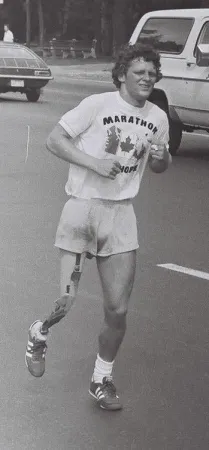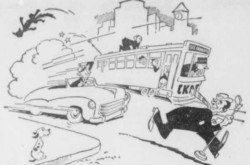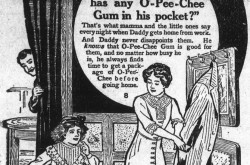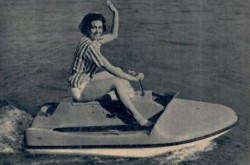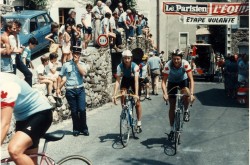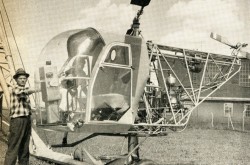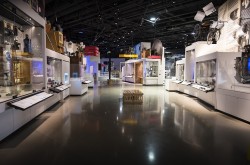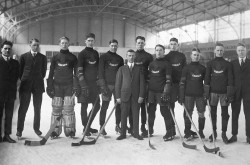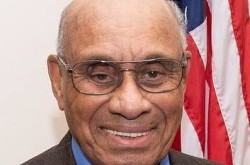From sea to sea: Terry Fox’s Marathon of Hope
This article was originally written and submitted as part of a Canada 150 Project, the Innovation Storybook, to crowdsource stories of Canadian innovation with partners across Canada. The content has since been migrated to Ingenium’s Channel, a digital hub featuring curated content related to science, technology and innovation.
For most people, the loss of a leg to cancer would be devastating. But Terry Fox said it made his life challenging and rewarding. Of course, Fox wasn’t your average athlete. His situation didn’t hold him back from chasing his dreams. Instead, it helped him campaign for the awareness of cancer, its research and the perception of people with motor impairments. To this day Fox instills hope in our nation.
Terry fox was 18 years-old just starting his degree in kinesiology, when he was diagnosed with osteosarcoma, a cancer that begins in the legs. He had his right leg amputated that same year and began chemotherapy soon after. The treatment was 16 months long and caused him to be nauseated and his hair to fall out. As draining as the ordeal was Fox remained in high spirits. Many people undergoing chemotherapy around him were in late stages of cancer. Seeing people dying so close to him while he recovered from treatment stirred a sense of responsibility in Fox.
He received an artificial leg a few weeks after his amputation and quickly returned to his habits of exercising, despite being in a wheelchair. The Vancouver Cable Cars, a wheelchair basketball team, asked him to join them. Fox promptly agreed as a fan of the sport. He practiced until his hands bled to relearn the game in this new form. He’d also keep up on cardio training by traversing rocky roads and climbing mountains in his wheelchair. With Fox, the Cable Cars went on to become one of the best teams in North America.
While in treatment Fox read an article about Dick Traum, an amputee who ran in the New York City Marathon. Inspired by this news, Fox decided he would pursue his passion for running despite his cancer-driven condition. He asked his prosthetist to modify his prosthetic leg so it’d be easier to run with. It wasn’t perfect, but Fox persisted.
He ran in Prince George, British Columbia, for a 27-kilometre race, which gave him the idea to tackle the entirety of Canada. This led to the Marathon of Hope, Fox’s gift to the world and ambition to run from the east coast of the country to the west, in order to raise awareness and funds for cancer research. By the time he was about to begin this journey in 1980 he got the support of big organizations like the Canadian Cancer Society, the War Amputations of Canada, Ford Motor Company and Adidas.
The Marathon of Hope began April 12, 1980, in St. John’s, Newfoundland. Fox ran about 42 kilometres a day, supported by his old friend, Doug Allard, and brother, Darell Fox. His run was poorly publicized in the Atlantic provinces and Quebec, where he raised little money. But in Ontario, he became a national star and was escorted by the Ontario Provincial Police. In the province, he met with then prime minister, Pierre Elliot Trudeau, and many celebrities. The Toronto Star even had a weekly column about his progress.
After running 5,373 kilometres in 143 days, Fox reached Thunder Bay, Ontario, where his marathon came to an abrupt end. The cancer Fox was suffering from had reached his lungs and he was to return to Vancouver for treatment. Fox passed away on June 28, 1981, shortly before his 23rd birthday.
Although he wasn’t able to complete the Marathon of Hope, Fox did accomplish what he sought out to do. He wanted to raise a dollar per Canadian at the time and reached that goal of 24 million dollars in February of 1981. To this day money for cancer research is raised in his name. The annual Terry Fox Run is a marathon organized by the Terry Fox Foundation each year and millions participate across several countries. The Terry Fox Research Institute opened in Vancouver as well, continuing to research cancer in his honour.
Fox changed Canada, teaching the country to cheer in the face of adversity. He was made a companion of the Order of Canada, a person of National Historic Significance by the government of Canada and inducted into Canada’s Sports Hall of Fame. While his life may have been cut short by a terrible disease, this Canadian legend’s spirit still runs in the veins of our country.
By: Jassi Bedi
Transcript
00:00
(heavy breathing)
00:06
I'm not special.
00:07
Cancer happens to people all the time.
00:11
(horn honks)
00:14
I take one mile at a time, 26 miles a day.
00:22
I want to set an example that'll never be forgotten.
00:26
(heavy breathing)
00:29
Sometimes...
00:31
It feels endless.
00:33
(heavy breathing)
00:35
But the pain I feel is nothing.
00:37
I've seen little kids in so much pain.
00:41
Somewhere...
00:42
The hurting must stop.
00:47
Terry Fox ran more than halfway across Canada to raise money for cancer research.
00:53
Every year, millions of people around the world continue
00:56
the Marathon of Hope in his name.



